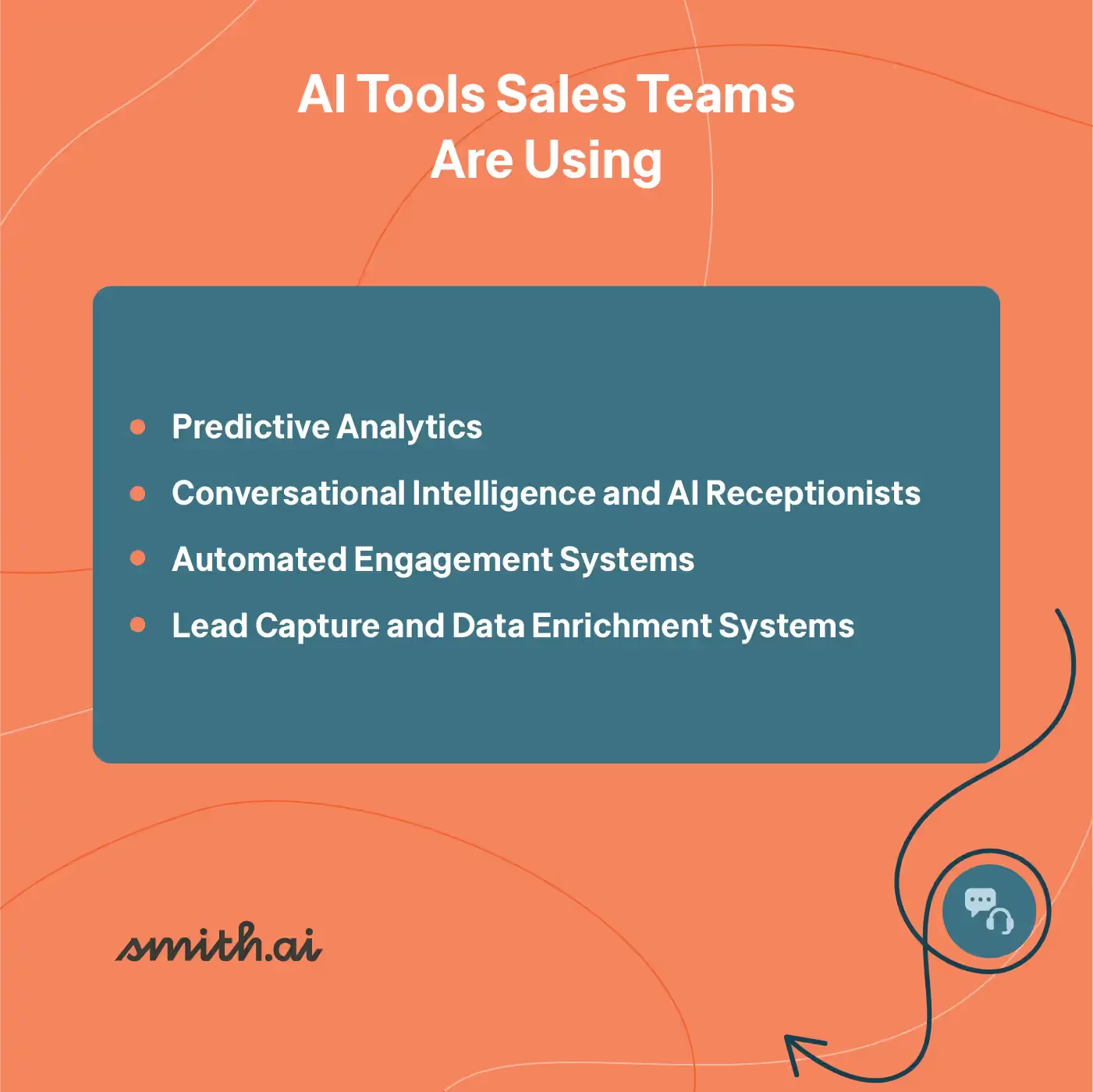Here are the Best AI Tools for Sales Growth in 2025
Here are the Best AI Tools for Sales Growth in 2025

Forget the AI hype cycle — we're already in the new digital age And sales teams not leveraging artificial intelligence are actively falling behind. While your competitors automate prospecting and deploy predictive analytics, traditional sales approaches are becoming as outdated as cold calling from the Yellow Pages.
The stakes couldn't be higher: More than half of businesses have already increased AI investments since early 2023, a trend that will continue to rise over the next decade.
The uncomfortable truth? Companies slow to adopt AI aren't just missing opportunities. They're creating competitive disadvantages that will become increasingly difficult to overcome as the gap between AI-powered teams and traditional approaches widens.
Types of AI for Sales Transforming the Industry
Sales teams are leveraging various categories of AI to revolutionize their approaches:
- Conversational AI: These chatbots and virtual assistants work tirelessly on your website, social media, and fielding sales calls, guiding prospects through your sales funnel while you sleep. That's the promise of conversational AI, and businesses are racing to implement it.
- Predictive Sales AI: Think of this as your crystal ball — it analyzes past data and customer behavior to forecast future trends with uncanny accuracy.
- Generative AI: This creative genius crafts new content like text and images by learning from existing data, making it invaluable for generative AI for leads. According to Salesforce, 68% of employees using it report delivering better customer service.
Key Benefits of AI for Sales
The integration of AI into sales operations offers multiple strategic advantages:
- Boosting Sales Productivity: Generative AI handles the mind-numbing tasks your team hates — data entry, information retrieval, routine emails — freeing them to focus on what humans do best: building relationships and closing deals.
- Improving Sales Forecasting: Forget gut feelings and educated guesses. AI-powered tools emphasize the importance of data analytics, devouring massive data sets to predict market trends and customer demands with precision that human analysis simply can't match.
- Enabling Data-Driven Training: AI watches every call, analyzes every email, and identifies exactly what your top performers do differently, giving managers actionable insights to transform average reps into sales superstars.
- Personalizing Customer Experiences: Remember how Amazon seems to know what you want before you do? AI brings that same personalized experience to your sales process through tools like AI website chat, creating buyer journeys so relevant that prospects feel you're reading their minds.
- Enriching CRM Data: Your CRM is only as good as its data. AI ensures it stays pristine and current, giving your sales team instant access to accurate customer information when it matters most.
- Enhancing Customer Engagement: Through predictive analytics, AI helps you improve customer engagement by reaching out to the right prospects, with the right message, at precisely the right time, dramatically improving your hit rate.
AI transforms sales from an exhausting grind into a strategic game where your team focuses their talents where they'll have the biggest impact while automation handles everything else.
Top AI Tools Sales Teams are Using
Remember when sales success meant simply making more calls than your competitors? Well, those day might be over.
Today's sales leaders are wielding AI for sales activities like a superpower. And the results are staggering. Let's explore the game-changing tools making this possible.
Predictive Analytics
Predictive analytics has become the secret weapon for sales teams who want to stop guessing and start knowing. This tech digests mountains of historical data to forecast future outcomes with stunning accuracy.
Here's how forward-thinking teams are using it:
- Lead Scoring and Conversion Prediction: Instead of treating all prospects equally, AI lead generation uses predictive models to analyze dozens of factors to identify which leads are most likely to convert. This lets your team focus their energy on high-potential opportunities rather than chasing dead ends.
- Customer Churn Prediction: The software flags customers who show early warning signs of leaving, before they've even thought about canceling. This gives you the chance to swoop in with retention strategies while there's still time to save the relationship.
- Sales Forecasting: For example, manufacturers can use this technology to analyze metrics like win rates and sales cycles, uncovering insights that traditional forecasting methods miss completely. The result? More accurate predictions that help them allocate resources where they'll have the biggest impact.
Conversational Intelligence and AI Receptionists
Imagine having sales assistants who never sleep, never complain, and get smarter with every conversation. That's the promise of conversational AI, and businesses are racing to implement it. The chatbot market alone is projected to explode to approximately $27.2 billion by 2030.
These tools are transforming sales in several ways:
- 24/7 Lead Qualification: While your competitors' websites sit dormant after hours, your AI receptionist engages visitors, asks qualifying questions, and schedules follow-ups with your human team, capturing opportunities that would otherwise slip away in the night.
- Call Analysis: Your AI assistant listens to every sales call, transcribes it perfectly, and, through conversation analytics, highlights key moments — customer objections, needs expressed, and buying signals — that human ears might miss. A freight company uses this technology to identify exactly what language and techniques their top performers use to close deals.
- Voice Analysis for Sales Coaching: Life sciences companies now deploy virtual actors that simulate tough sales scenarios, providing real-time coaching when a rep stumbles. The AI notices subtle patterns — speaking too quickly when nervous, interrupting the customer, missing buying signals — and offers immediate guidance to improve.
Automated Engagement Systems
The most successful salespeople make prospects feel like they're the only customer who matters. Automated engagement systems bring this level of attention to every prospect in your pipeline:
- Personalized Email Generation: AI analyzes your prospect's industry, role, past interactions, and dozens of other data points to craft messages that feel like they were written just for them. Not just generic templates. Financial advisors use these tools to generate customized presentations that speak directly to each client's unique concerns and goals.
- Follow-up Automation: The difference between closing and losing often comes down to consistent follow-up. AI systems ensure no prospect falls through the cracks, sending perfectly timed messages, scheduling meetings, and answering common questions without human intervention.
- Content Recommendations: AI can suggest exactly which case study, blog or product demo will resonate most with each prospect based on their interests and stage in the buying journey. This level of personalization was previously impossible at scale.
Lead Capture and Data Enrichment Systems
The foundation of sales success is quality data, and AI is revolutionizing how teams gather and utilize prospect information:
- Intelligent Lead Scoring: Software companies now use predictive models and sales prospecting tools to instantly evaluate new leads based on dozens of factors, ensuring sales reps spend their valuable time on prospects most likely to convert rather than spinning their wheels on dead ends.
- Data Quality Enhancement: AI tools continuously clean, deduplicate, and enrich your prospect database, ensuring your team always works with accurate, complete information instead of wasting time on outdated contacts or duplicate entries.
- Competitive Intelligence: Many firms deploy AI tools that scour the internet for competitor data, giving their sales teams instant insights into rival strategies and positioning — intelligence that helps them differentiate their offerings during crucial sales conversations.
These AI tools aren't just making sales teams more efficient. They're creating an entirely new playbook for success. Sales organizations that embrace these technologies gain an almost unfair advantage over those still relying on traditional methods alone.

Real-World Applications: AI for Sales in Action for Small Businesses
Feeling like AI is only for the big players with massive budgets? Think again. Today's AI landscape offers affordable, accessible tools that level the playing field for small businesses. Here's how you can implement powerful AI solutions without breaking the bank or hiring a team of data scientists.
Practical AI Applications for Sales Optimization
If you're running that local retail shop you've dreamed about since college, AI-powered sales forecasting can help your inventory management. Instead of relying on gut feelings about what might sell next season, affordable AI tools analyze your historical sales data alongside seasonal trends to predict exactly what you'll need.
For service businesses like that plumbing company, AI is aiding in lead generation. Think of a system that automatically scores every incoming service request based on factors like location, service type, and customer history.
Your AI tool flags the homeowner in the affluent neighborhood requesting a full bathroom remodel as a top priority lead, routing them immediately to your best salesperson. Meanwhile, the routine drain cleaning goes to your newer team members. Tools like these help you focus your best resources where they'll generate the highest return.
Running that e-commerce brand on the side? Personalization AI analyzes each customer's purchase history to create "just for you" product recommendations that feel almost magical.
When a customer who previously bought hiking boots visits your site, the AI might showcase your new line of performance socks or trail maps — items they didn't even know they wanted yet. This level of personalization typically boosts average order values and repeat purchases dramatically, and you can implement it through affordable plug-ins for most e-commerce platforms.
These applications highlight the impact of generative AI in industries, showing how businesses of all types can benefit.
Cost-Effective Implementation Strategies
Starting your AI journey doesn't require emptying your bank account. Here's how to implement solutions that deliver immediate value:
- Begin with a pilot program: If you run an insurance agency, don't try to overhaul everything at once. Start by testing an AI chatbot that pre-qualifies website visitors before scheduling them with your agents. Measure the results, refine the approach, and expand only when you're seeing clear benefits.
- Leverage cloud-based solutions: Rather than building custom systems, tap into ready-made cloud services. These subscription models let you pay only for what you need while getting sophisticated technology that previously required massive investments.
- Explore government grants: Your tax dollars are funding programs specifically designed to help small businesses adopt new technologies. In the US, for example, there are grants that provide resources tailored to small and medium businesses implementing AI. Many other countries offer similar programs — money sitting there waiting for savvy business owners to claim it.
- Invest in AI literacy: Take advantage of free or low-cost training resources. Understanding the basics helps you identify valuable opportunities without getting bamboozled by vendors selling expensive solutions you don't need.
The smart approach is starting small with focused applications, such as OpenAI applications, that address specific pain points in your sales process. Measure the results, learn from the experience, and gradually expand your AI capabilities as you see concrete benefits to your bottom line.
Future of AI for Sales: Trends and Predictions
The AI sales landscape is evolving rapidly, with three key developments poised to transform how you sell:
Autonomous AI Agents Redefining Sales Roles
Autonomous AI agents represent the next frontier in sales automation. Unlike today's tools that require human direction, these systems will independently manage entire segments of the sales process — from initial prospecting to qualification and routine follow-ups.
This shift will fundamentally change sales roles. Your team will evolve from task executors to strategic orchestrators, focusing on complex negotiations and relationship-building while AI handles repetitive processes. For sales leaders, this means reimagining team structures and performance metrics around this new division of labor.
Hyperintelligent Decision Support
Tomorrow's AI will function as a strategic partner, providing real-time guidance during sales interactions. Imagine AI that analyzes customer sentiment during video calls, suggesting when to emphasize certain benefits or address unspoken concerns. These systems will process contextual signals humans often miss, creating a powerful synergy between AI analytics and human emotional intelligence.
The competitive advantage will go to organizations that effectively blend AI insights with human judgment rather than relying exclusively on either.
AI-to-AI Sales Environments
Perhaps most revolutionary is the emergence of AI purchasing agents on the buyer side. As your prospects deploy their own AI to evaluate vendors, we'll increasingly see scenarios where AI systems negotiate with each other before humans enter the conversation.
This creates an entirely new paradigm where structured data and quantifiable value propositions become critical. Sales organizations must prepare for environments where the first "impression" is made on a buyer's AI system rather than a human decision-maker.
These developments aren't science fiction. They're emerging realities that forward-thinking sales organizations are already preparing for. The window for gaining competitive advantage through early adoption is rapidly closing as these technologies become mainstream.
Challenges and Solutions in Adopting AI for Sales
Implementing AI for sales isn't without obstacles, but with strategic approaches, these challenges become manageable:
Key Implementation Challenges
Change Management Resistance: The most significant barrier isn't technology but human psychology. Sales professionals who've succeeded through relationship-building may view AI as threatening their value or undermining their personal touch. This resistance manifests in low adoption rates and workarounds that undermine implementation.
Ethical Data Usage: As AI systems collect and analyze increasingly personal customer data, organizations face complex ethical questions about appropriate use. Walking the line between helpful personalization and invasive surveillance requires thoughtful governance frameworks.
Skill Gap Bridging: Most sales teams lack the technical expertise to effectively implement or evaluate AI solutions, while technical teams often don't understand sales processes deeply enough to build truly useful tools. This disconnect leads to solutions that look impressive in demos but fail to deliver real-world value.
Practical Solutions
Hybrid Implementation Models: The most successful organizations adopt hybrid approaches where AI handles routine tasks while human salespeople maintain ownership of relationship-building, achieving a harmonious blend of human empathy and AI.
Transparent Value Communication: Frame AI adoption around specific pain points salespeople experience daily. When your team sees AI as eliminating administrative burdens rather than replacing their expertise, resistance transforms into enthusiasm.
Continuous Feedback Loops: Create structured channels for sales teams to provide ongoing feedback about AI tools. This not only improves the technology but gives salespeople agency in the transformation process, increasing buy-in and adoption.
Ethical Guidelines Development: Establish clear ethical frameworks for AI use before implementation begins. This includes policies on data collection transparency, customer consent practices, and appropriate personalization boundaries.
Organizations that address these challenges proactively position themselves to capture AI's benefits while avoiding the pitfalls that derail many implementation efforts. The most successful approaches view AI adoption as an organizational change initiative rather than merely a technology deployment.
The Strategic Edge of AI for Sales
The question is no longer whether AI will transform your business — it's whether you'll be a leader or a laggard in this revolution. Companies that embrace AI now aren't just optimizing processes; they're fundamentally redefining what's possible in sales performance.
You can’t afford to wait for perfect conditions to begin your AI journey. Start by assessing your organization's specific sales challenges and identifying where AI could create immediate value. Even small implementations can yield significant competitive advantages in today's increasingly AI-driven sales environment.
Looking for an easy way to start? Try Smith.ai. If your business relies on inbound phone calls to get new clients, book a free consultation and learn how Smith.ai can help you, like we’ve done for thousands of businesses already.
Take the faster path to growth. Get Smith.ai today.
Key Areas to Explore

Your submission has been received!














.svg)



